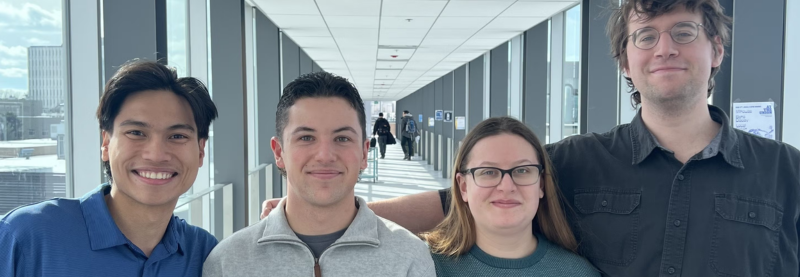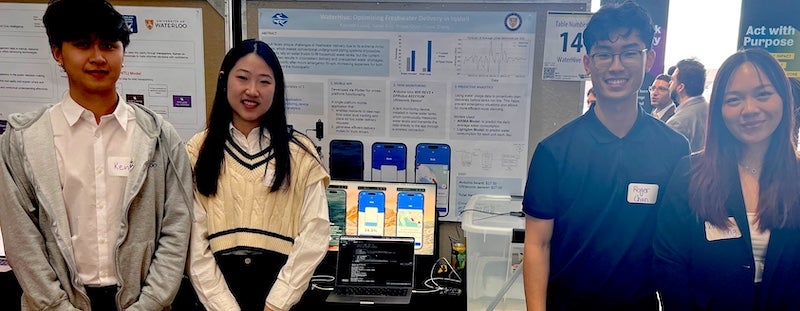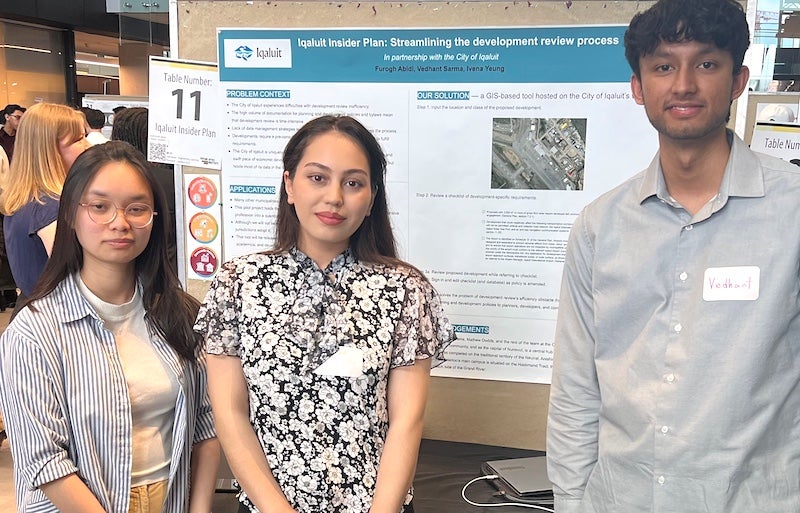
From campus to community
Interdisciplinary initiative allows students to bring real-world impact to Canada’s North

Interdisciplinary initiative allows students to bring real-world impact to Canada’s North
By Angie Docking Faculty of EngineeringA new collaboration between the University of Waterloo and the City of Iqaluit is allowing students to apply their skills to real-world challenges — all while making a tangible difference in the North.
The partnership was possible through i-Capstone — the University of Waterloo’s first interdisciplinary undergraduate capstone program. Designed to unite students from every faculty, i-Capstone enables students to tackle complex problems facing Canadian communities — like sustainable housing, infrastructure and integrated urban planning — all for academic credit.
Practical solutions for real-world problems
With an Arctic environment presenting a unique set of challenges for local government, the City of Iqaluit partnered with four student teams to address some of the municipality’s most pressing challenges.
Student teams met biweekly with City of Iqaluit staff over the course of two terms to pitch their ideas, gather feedback and refine their projects. Students also received counsel from faculty advisors, Velocity, Future Cities Institute and fellow classmates.
A new partner to Waterloo, representatives from the City of Iqaluit made the long journey to meet with i-Capstone leadership in the fall term and have since made plans to begin hiring Waterloo co-op students.
Building resilient solutions
Faculty of Environment student Carlo Smokowich’s team focused on improving the city’s roads, which suffer from dust accumulation and potholes due to the harsh climate.
Smokowich emphasized the team’s strength in bringing diverse perspectives from different faculties. "We were lucky to have a business student to focus on community impact, an environment student looking at sustainability and engineers to manage the technical side,” Smokowich says. “It was helpful to learn from my teammates and to experience a completely different way of learning and problem-solving."
After researching alternative paving solutions — such as chip-seal and polymer-modified asphalt — and examining successful examples from Alaska and the Yukon, the team ultimately proposed a novel, durable and cost-effective solution for the city.
 Left to right: Rafeael Llorin, Carlo Smokowich, Sarah Nicole Knoblauch, Matthew Andreas Scheinder
Left to right: Rafeael Llorin, Carlo Smokowich, Sarah Nicole Knoblauch, Matthew Andreas Scheinder
Faculty of Math student Ao Shen’s group took on the challenge of enhancing the city’s outdated asset management system, which struggles to maintain vehicles and infrastructure efficiently. According to Shen, one of their greatest challenges was the ‘real-world’ learning component, considering how their tool would live beyond their final presentation.
"This project made us really consider beyond just developing a functional tool," Shen says. "We really had to think about its longevity and impact on the community." Ultimately, they developed a predictive maintenance tool that tracks usage and automates part ordering, saving both time and money.
 Left to right: Lucas Yurcich, Ao Shen and Katie Burt
Left to right: Lucas Yurcich, Ao Shen and Katie Burt
Faculty of Health student Roger Chan’s group tackled water delivery—a crucial issue in Iqaluit, where residents depend on trucks to fill household tanks. Their mobile app solution tracks water levels in real time, using predictive analytics to optimize deliveries and reduce emergencies, giving residents peace of mind.
Chan, who had previously worked in government through co-op roles, noted that this experience felt different. "Usually, it isn’t just one team that gets to propose, develop, and present a solution and then expect change," he says. "That’s why working with Iqaluit was special — we had direct access to decision-makers so we could develop our solutions faster."
Kenneth Luong, a Faculty of Engineering student and Chan’s teammate, echoed that sentiment. “This was my first time leading a project and being responsible for an outcome that really mattered,” he says. “That level of accountability was challenging, but it pushed us to grow our skills together.”
 Left to right: Kenneth Luong, Grace Zhang, Roger Chan and Karen Eng.
Left to right: Kenneth Luong, Grace Zhang, Roger Chan and Karen Eng.
A lasting impact
After i-Capstone wraps up in the winter term, the City of Iqaluit will begin exploring how to put these Waterloo student innovations into practice to better serve local residents.
Faculty of Math students Ivena Yeung and Vedhant Sarma, whose team developed a much more user-friendly GIS-based tool designed to help local governments streamline access to policies and zoning regulations, were very grateful for the unique experience i-Capstone has given them and recommend it to other students looking to work beyond the classroom.
"This is the kind of project you dream of as a student—to take on a challenge that matters and see your work make an impact," Yeung says. Sarma agrees, adding, "This project is something I’ll carry with me long after graduation."
 Left from right: Ivena Yeung, Furogh Abidi and Vedhant Sarma.
Left from right: Ivena Yeung, Furogh Abidi and Vedhant Sarma.
Photo credit: Shutterstock (banner image)

Read more
Here are the people and events behind some of this year’s most compelling Waterloo stories

Read more
Waterloo's Interdisciplinary Capstone and Future Cities Institute awarded student groups cash prizes for their creative solutions to real-world challenges

Read more
Discover how Waterloo alumni are driving Canada’s economy with five tech companies making a local and global impact
The University of Waterloo acknowledges that much of our work takes place on the traditional territory of the Neutral, Anishinaabeg, and Haudenosaunee peoples. Our main campus is situated on the Haldimand Tract, the land granted to the Six Nations that includes six miles on each side of the Grand River. Our active work toward reconciliation takes place across our campuses through research, learning, teaching, and community building, and is co-ordinated within the Office of Indigenous Relations.